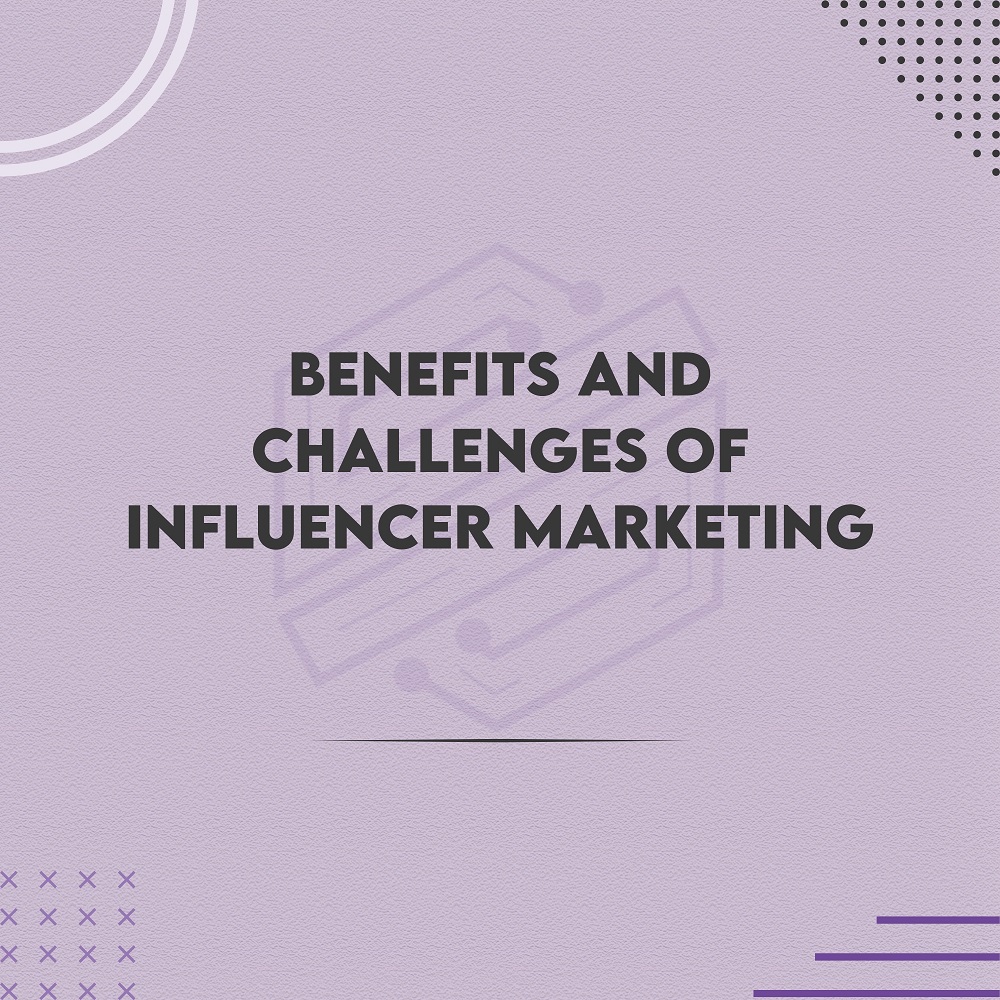Here’s a breakdown of the benefits and challenges of influencer marketing.
Benefits:
Broadening the audience: Influencer marketing enables brands to engage the followers of influencers, who often have large engaging audiences. This expanded channel helps brands connect with potential customers who may not have been reached through traditional marketing efforts.
Penetrating markets: Influencers often have followers with specific interests or demographics, allowing companies to better target niche markets. Resulting in high revenues.
Word of mouth: When influencers promote a product or service to their followers, it can generate word of mouth. Followers trust an influencer’s recommendation, increasing brand credibility and potential sales.
Viral power: The influencer’s shared content has the potential to go viral, reaching a large audience beyond their immediate followers. This viral effect can significantly amplify a brand’s message and increase brand awareness.
Lower delivery costs: Compared to traditional advertising channels, influencer marketing can provide a cost-effective way to reach a wider audience. It can be more economical than creating dramatic advertising campaigns, especially for brands with limited marketing budgets.
Trust and trust: Influencers tend to build strong relationships with followers, which they build on trust and authenticity. When influencers promote a product or service, their audience is likely to perceive the recommendation as authentic and trustworthy, increasing brand credibility.
Humanizing the brand: By teaming up with influencers who share their values and brand identity, companies can humanize their brand. Influencers add personality to promotional content, making it relatable and authentic to consumers, which can strengthen brand loyalty.
Creating authentic content: Influencers are adept at creating authentic and engaging content that resonates with their audience. This user-generated content can create a new perspective on a brand or product, capturing consumers’ attention in ways that traditional advertising cannot.
Targeted Audience Relationships: Influencers often have a specific niche or demographic following, allowing brands to target their messages to the right audience. This targeted approach enhances the authenticity of the marketing campaign, as the content is tailored to the interests and preferences of the influencer’s followers.
Real-time feedback: Influencer marketing enables brands to deliver real-time feedback from their target audience. Through comments, preferences, and sharing influential content, companies can gauge consumer sentiment, preferences, and engagement, helping them optimize their marketing strategies for authenticity and effectiveness.
Creating diversity: Influencers bring a uniquely creative approach to collaborating with brands, they are diverse and exciting. Their creativity in creating new ideas and storytelling can engage audiences and differentiate the brand in a crowded marketplace.
Fresh Marketing Approaches: Influencers often experiment with new trends, programs, and platforms, allowing companies to explore new ways of doing business. By leveraging influencers’ creative strategies, brands can stay relevant, adapt to changing consumer preferences, and reach new audiences effectively.
Visual appeal and aesthetics: Influencers excel at creating engaging, beautiful content that resonates with their audience. Their creative vision of design, photography, and video imagery can increase the visual identity of the brand, create a stronger visual connection with consumers, and enhance brand memories.
New campaign ideas: By partnering with influencers, brands can come together to create new campaign ideas that break through the advertising clutter. The creativity of influential people can spark new ideas, challenge traditional marketing beliefs, and inspire memorable, shareable, and impactful campaigns to inspire brand awareness and loyalty.
Challenges:
High Costs:Collaborating with famous influencers or celebrities is often expensive. Some influencers charge high fees for sponsoring content or campaigns, making it difficult for small businesses with limited budgets to afford such partnerships.
Uncertain ROI: Despite the investment in influencer marketing, measuring return on investment (ROI) can be difficult. The impact of influencer campaigns on sales, brand awareness, or customer engagement may not always be straightforward, creating uncertainty about costs.
Budget allocation: Allocating a large portion of the marketing budget to influencer agencies can be risky, especially if results are not as expected. Balancing the cost of influencer partnerships with other marketing tactics and strategies can be a challenge for brands aiming to scale their marketing efforts.
Influencer fraud: There is a risk of facing influencer fraud, where influencers can artificially inflate their follower counts or engagement measures to command higher fees.This can lead to brands paying for shares based on misleading data and not getting the results they want.
Long-term commitments: Some influencer partnerships require long-term commitments or agreements, which can lock brands into deals that may not deliver expected results. Fluctuating market trends or changes in audience preferences may provide these long-term systems more complex.
Brand alignment: Maintaining control over how influencers represent the brand and its values can be a challenge. Influencers can have their style and voice, which can sometimes clash with the desired image of the brand, leading to message and brand confusion.
Optimizing content: It is difficult to ensure the quality of influencer-produced content, as brands have little control over the creative process. Differences in content style, tone, or presentation can affect the overall image of the brand, necessitating a balance between creative freedom and branding strategies for brands.
Message interpretation: Influencers may interpret a brand’s message differently or articulate it in a way that is counter to the intended meaning. This lack of control over how messages are delivered can lead to packages being misunderstood or misrepresented, which can lead to audience confusion.
Negative associations: In some cases, influencers may engage in actions or practices that are inconsistent with the brand’s values. This lack of control over influencer actions other than sponsoring content can lead to a negative relationship with the brand, affecting its reputation and credibility.
Compliance and disclosure: Ensuring that influencers comply with advertising laws and display sponsored content creates legal challenges for brands. Failure to follow disclosure guidelines can lead to legal consequences that have occurred or damaged the integrity of the brand, emphasizing the importance of monitoring and enforcing control measures.
Overall, while influencer marketing offers benefits such as increased reach and loyalty, it also presents challenges such as cost, lack of authority, trust issues, and a fairly saturated market that brands consider when implementing marketing strategies.





